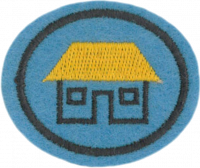Especialidades JA/Techos de paja/Respuestas
Nivel de destreza
2
Año
Desconocido
Version
07.01.2025
Autoridad de aprobación
Asociación General
1
2
3
4
4a
4b
4c
5
5a
5b
5c
5d
The construction of the thatched roof also plays a key role in its susceptibility to fire. Thatch should be densely packed, between 35 to 50 kg/m2, and at least 175 mm thick.
Wire should not be used in the construction of a thatched building, as it is a conductor of lightning. Rather, natural materials should be used to bind the thatch, such as sisal twine.
The building should also be equipped with proper lightning protection.
No wiring should enter the building through the thatch (including electrical, telephone, cable TV, etc.). Rather, it should enter either underground through a conduit, or through a non-thatched wall. Antennas should never be mounted on a thatched roof.
The roof should be regularly groomed so that loose straws (which are easily ignited) are removed.
Decay
Thatch is obviously an organic material, and as such, it is susceptible to decay. To protect against this, the thatch should not be harvested until after the first frost has ended its growing season. After it is harvested, it should be stored off the ground and under cover. Leaves should not be allowed to accumulate on the roof of a thatched building, and the roof should be steep - at least 45° - to facilitate the rapid runoff of water. The growth of vegetation on a thatched roof inhibits runoff, so it should be removed quickly if it takes hold.
Vermin
Thatch may be attacked by all manner of vermin, though their numbers are usually held quite low. Any number of poisons can be sprayed on the thatch to eliminate this problem.
6
7
7a
A rondavel is usually thatched by a team of four people.
The first worker passes the bundles of thatch up to the workers on the roof. Before doing this, he will butt the end of the bundle on a flat surface. This blunts the ends of the straws and lines them up.
Two more people work on top of the roof, and a fourth person works from the inside.
7b
7c


